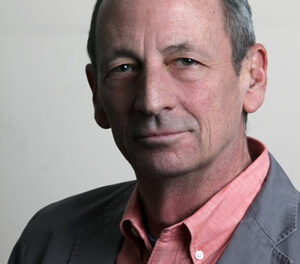Duke University’s impresario, Aaron Greenwald, proved his intellectual mettle last season with a bristling weave of performance programs that linked culture and ideas in exhilarating ways. In Page Auditorium Thursday night, he demonstrated that he and Duke are going to show even more backbone this year, as he kicked off the season with the first installment of the Art/Politics/Now series of Duke Performances.
For the first show, Greenwald had called in an expert to make sure we’ve all got a grasp on the zeitgeist of America 2008. Laurie Anderson (vocals, electric violin, synthesizer), along with Eyvind Kang (viola), Skull Sverrisson (electric bass) and Kevin Hearn (keyboards, accordion, vocals), performed her most recent show, Homeland. It is the kind of thing that used to be called subversive, as in expressing a driving need to subvert the dominant paradigm. If you like the fear that’s been cultured and inculcated in our lives; if you are A-OK with the fascistic ties between corporations and government; if you believe in pre-emptive strikes, inciting civil war in resource-rich countries and sending children to do the dirty work; if you approve of secret prisons and military tribunals; if you don’t think global warming is a problem; and especially if you love greed and forgetting, this show would make you very uncomfortable. Maybe that’s why some people walked out.
The show is well-structured (unlike some performance artists, Anderson remembers to put the art in), with a poetic opening about the beginning of memory, derived from Aristophanes’ The Birds. The songs wander a plaintive path toward the excoriating “It takes an expert to deal with a problem,” which thunders with mockery and synthesized drum tracks, before winding back through a demented American landscape, its neural pathways clogged with a sad, sickening plaque that erodes memory and encourages forgetting.
Anderson, who has been touring this show around the world for several months already, didn’t quite put the thing into overdrive, but she was scathing on these topics and more, and her spiel was as fresh as last week, though not quite up to the very moment. (She’d worked in pit bulls, pigs and lipstick, but hadn’t yet removed a line about this being a good time for bankers.) Even sitting in her choir while she preached, one felt flayed with the whips of outrage and disgust. If this had been merely spoken word, I doubt the audience could have held on for the nearly two unbroken hours. But music makes the monologues go down easily, and computer-aided electronica enables wonderful effects in the hands of talented musicians. Some of the music is so beautiful that it makes you willing to dwell on painful words — thus, it passes the test for art. Its power as agit-prop will be measured by what, if anything, we do after having heard it.
Art and politics will mix again at Duke on the 26th with the appearance of Charlie Hayden’s Liberation Music Orchestra with Carla Bley. See our calendar for details.












